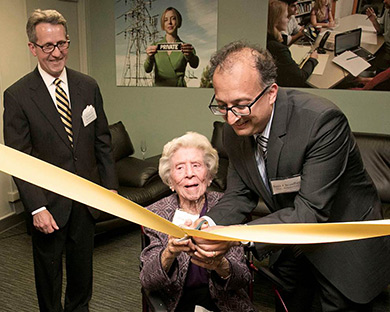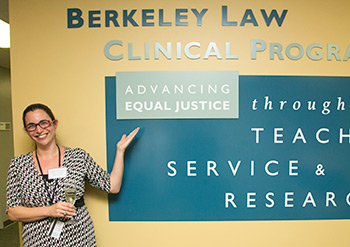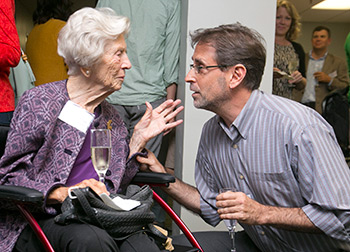By Andrew Cohen

Choudhry cut the ceremonial ribbon to open Berkeley
Law’s new clinical program offices.
Berkeley Law’s clinical education program now sees a bright future ahead because of Bernard Witkin’s vision. “He was several decades ahead of his time in his advocacy of more practical law training conducted in a clinical setting,” Kenneth Kuchman said of Witkin ’28. Kuchman now runs the philanthropy established in the alum’s name: the Bernard E. and Alba Witkin Charitable Foundation.
Thanks to a major gift from the foundation, the law school was able to create a modern, professional office suite designed to maximize efficiency and collaboration. Previously, the school’s in-house clinics operated in separate, overcrowded spaces.
Alba Witkin, Bernard’s widow, attended a ribbon-cutting ceremony on Aug. 27.
“It was my pleasure to provide the funding to unite the various clinical law offices at Berkeley Law into one, new, space to gain the benefits and efficiencies of such a move,” she said, noting that the gift was made “in honor of Bernie’s viewpoint as to the merit of clinical law training for law students.”
The Death Penalty Clinic, International Human Rights Law Clinic, and Samuelson Law, Technology & Public Policy Clinic now share the new space. Together with the offsite East Bay Community Law Center, Berkeley Law’s clinical programs provide vital, hands-on experience to more than 100 students each semester. Roughly one-third of students participate in a clinic before graduating.

administration, in the new office space.
“It’s what we always hoped for and dreamt about, and now it’s here,” said Amy Utstein, the clinical program’s director of administration. “We finally have the kind of space we need to run a clinical program at a world-class law school. We could not be more pleased or more grateful.”
At the ceremony, Dean Sujit Choudhry hailed the clinics’ far-reaching contributions to their clients and students and described some of their recent projects.
Trials and triumphs
For the past two years, the International Human Rights Law Clinic (IHRLC) has taken the lead in coordinating legal services for UC Berkeley’s new Undocumented Student Program. The first of its kind in the nation, the program provides comprehensive support services to the more than 300 undocumented graduate and undergraduate students on campus.
“These students are now protected from deportation,” Choudhry said. “They are able to pursue academic and career opportunities that were previously unavailable to them due to their status.” The clinic has also conducted empirical research with these students, and this fall will release a report with recommendations to national lawmakers to craft more humane immigration policies.
Litigation brought by the Death Penalty Clinic on behalf of death-sentenced prisoners often falls necessarily below the radar. This year, however, it won a major public victory in the California Court of Appeal. Through a California Public Records Act request of the San Diego District Attorney’s Office, the clinic sought to uncover documents it believes are evidence of a racially discriminatory pattern of the office’s charging decisions in capital cases.
“After initially losing in the trial court, the clinic successfully appealed…winning not only access to the records, but a sweeping, precedential ruling affirming the public’s right of access to government documents that shed light on some of the most important decisions state officials undertake,” Choudhry said. “The ruling stands as good law, after the California Supreme Court denied the DA’s requests to both review and de-publish the case.”
The Samuelson Clinic supports the public interest in technology law by advocating for social values in intellectual property, speech, and privacy. This year, students addressed overbroad national surveillance. On behalf of experts with direct experience—including James Bamford, the preeminent chronicler of the National Security Agency—the clinic filed an amicusbrief arguing that U.S. intelligence agencies risk repeating historical abuses.
The brief shows strong links between today’s surveillance and the growth of abusive practices in the mid-20th century—“when intelligence agencies helped conduct politically motivated surveillance of Americans ranging from ordinary teachers, journalists, and peace activists to civil rights leaders, members of Congress, and a Supreme Court justice,” Choudhry said.

director of the East Bay Community Law Center.
Operating from its downtown Berkeley office, the East Bay Community Law Center (EBCLC) houses 10 clinics and serves over 5,000 low-income clients annually. Among its recent triumphs, EBCLC students helped a Cambodian refugee with Posttraumatic Stress Disorder receive disability benefits and health care, prevented an elderly woman from being evicted from her rent-controlled apartment of 28 years, and helped pass California state legislation—drafted by a student—that will protect thousands of families from unscrupulous debt collectors.
Kuchman noted that today’s legal employers want “new attorneys to be able to start doing productive law work immediately after passing the bar exam. Clients are balking at paying untrained associates to obtain the training they need, and law firms are no longer able to absorb the lion’s share of the cost of training new associates. Therefore, clinical programs such as the one here at Berkeley Law perform an essential role in training attorneys for today’s needs.”